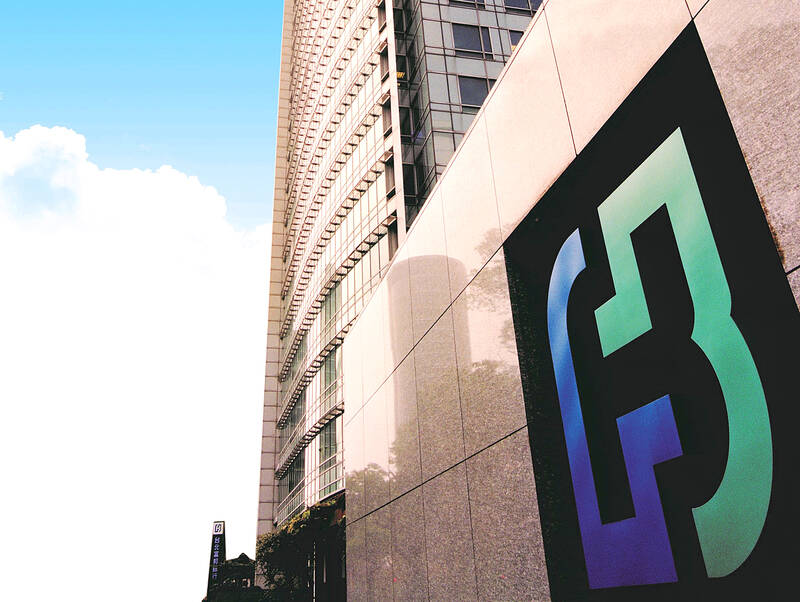Fubon Financial Holding Co (富邦金控) yesterday received approval from the Financial Supervisory Commission for its merger with Jih Sun Financial Holding Co (日盛金控), marking the first merger-and-acquisition deal between the nation’s financial holding companies.
The approval came about two years after Fubon Financial launched a tender offer to acquire a 50 percent stake in Jih Sun Financial for NT$13 per share in December 2020, valuing the deal at NT$24.53 billion (US$782.6 million).
The merger would reduce the number of local financial holding companies from 15 to 14.

Photo courtesy of Fubon Financial Holding Co
GREEN LIGHT
Shareholders of the two companies gave the go-ahead to the deal on Nov. 5 last year at extraordinary meetings.
Shareholders in June also agreed to Fubon Financial’s offering price of NT$11.71 cash per share to fully absorb Jih Sun Financial.
Fubon Financial, the nation’s second-biggest financial holding company by assets, had increased its shareholding of Jih Sun Financial to 73.91 percent as of May 31, according to a company filing with the Taiwan Stock Exchange.
Fubon Financial president Jerry Harn (韓蔚廷) last month told investors that the firm planned to complete its merger with Jih Sun Financial by the end of this year and to complete consolidating their units next year.
CUTTING COSTS
The consolidation is expected to boost Fubon Financial’s capital efficiency and cost optimization, and allow its banking and securities businesses to expand and provide more products to customers, the company has said.
Following the transaction, Fubon Financial would be the remaining entity, while Jih Sun Financial would be delisted from the Taipei Exchange, the Financial Supervisory Commission said in a statement.

UNCERTAINTY: Innolux activated a stringent supply chain management mechanism, as it did during the COVID-19 pandemic, to ensure optimal inventory levels for customers Flat-panel display makers AUO Corp (友達) and Innolux Corp (群創) yesterday said that about 12 to 20 percent of their display business is at risk of potential US tariffs and that they would relocate production or shipment destinations to mitigate the levies’ effects. US tariffs would have a direct impact of US$200 million on AUO’s revenue, company chairman Paul Peng (彭雙浪) told reporters on the sidelines of the Touch Taiwan trade show in Taipei yesterday. That would make up about 12 percent of the company’s overall revenue. To cope with the tariff uncertainty, AUO plans to allocate its production to manufacturing facilities in

TAKING STOCK: A Taiwanese cookware firm in Vietnam urged customers to assess inventory or place orders early so shipments can reach the US while tariffs are paused Taiwanese businesses in Vietnam are exploring alternatives after the White House imposed a 46 percent import duty on Vietnamese goods, following US President Donald Trump’s announcement of “reciprocal” tariffs on the US’ trading partners. Lo Shih-liang (羅世良), chairman of Brico Industry Co (裕茂工業), a Taiwanese company that manufactures cast iron cookware and stove components in Vietnam, said that more than 40 percent of his business was tied to the US market, describing the constant US policy shifts as an emotional roller coaster. “I work during the day and stay up all night watching the news. I’ve been following US news until 3am

Taiwan will prioritize the development of silicon photonics by taking advantage of its strength in the semiconductor industry to build another shield to protect the local economy, National Development Council (NDC) Minister Paul Liu (劉鏡清) said yesterday. Speaking at a meeting of the legislature’s Economics Committee, Liu said Taiwan already has the artificial intelligence (AI) industry as a shield, after the semiconductor industry, to safeguard the country, and is looking at new unique fields to build more economic shields. While Taiwan will further strengthen its existing shields, over the longer term, the country is determined to focus on such potential segments as

COLLABORATION: Given Taiwan’s key position in global supply chains, the US firm is discussing strategies with local partners and clients to deal with global uncertainties Advanced Micro Devices Inc (AMD) yesterday said it is meeting with local ecosystem partners, including Taiwan Semiconductor Manufacturing Co (TSMC, 台積電), to discuss strategies, including long-term manufacturing, to navigate uncertainties such as US tariffs, as Taiwan occupies an important position in global supply chains. AMD chief executive officer Lisa Su (蘇姿丰) told reporters that Taiwan is an important part of the chip designer’s ecosystem and she is discussing with partners and customers in Taiwan to forge strong collaborations on different areas during this critical period. AMD has just become the first artificial-intelligence (AI) server chip customer of TSMC to utilize its advanced